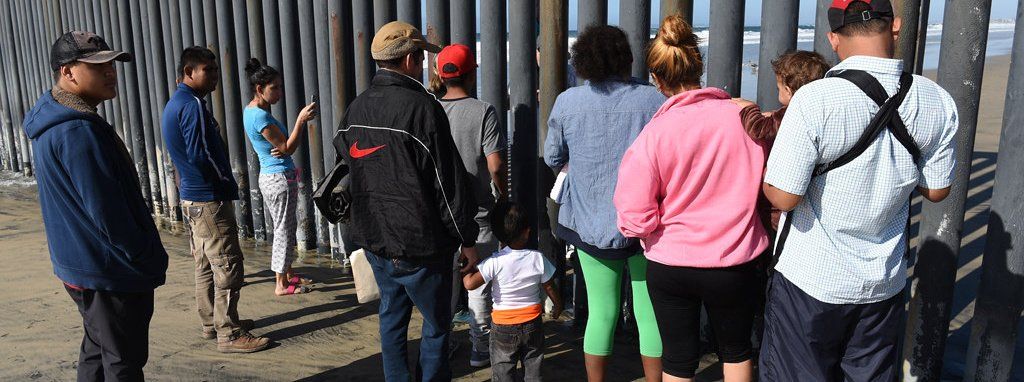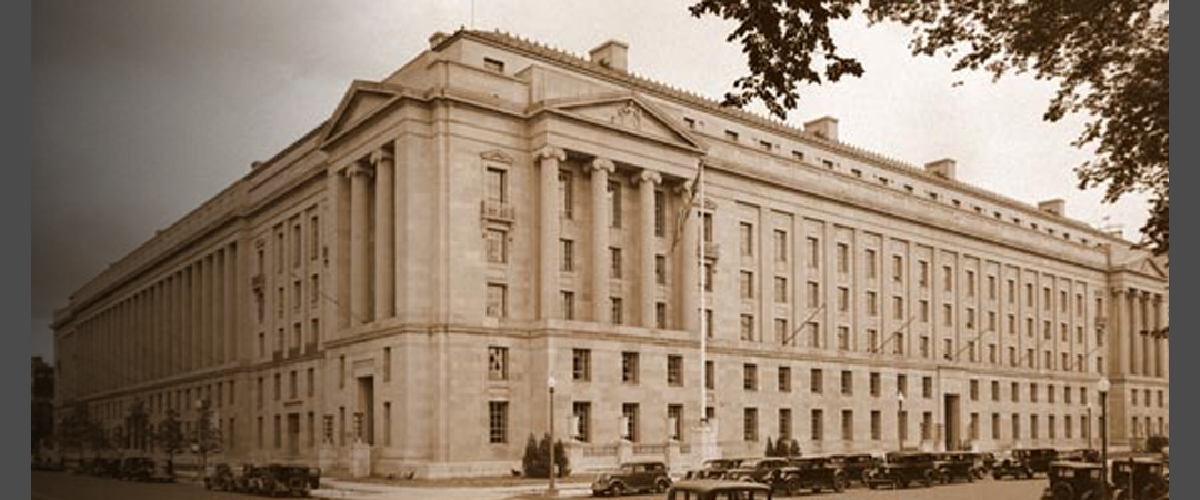Imagine — if You Can — the Desperate Plight of Refugees at Our Southern Border, Part 2
Dispelling the Myths of “Illegals” at the U.S. Border

Asylum seekers arriving at the southern border. Photo: Daniel Arauz via Flickr, CC
The United States has long guaranteed the right to seek asylum for individuals arriving at the nation’s southern border to seek protection from political violence, government corruption, or drug cartel-funded police or gangs. Since March 2020, that fundamental right has been largely suspended. The Trump administration’s hardline policies, the covid-19 pandemic, and now the virus’ delta variant, continue to produce many myths about asylum seekers.
Myth #1: Asylum seekers are ‘illegals.’
Evidenced by media broadcasts of protesters carrying signs stating “Illegals go Home,” many people in the U.S. have misconceptions and/or do not understand the asylum process.
The terms “refugees” and “migrants” are similar; the term “asylum seeker” is applied to those who have experienced certain events or actions which qualify them to seek asylum in the U.S. For the purposes of this article, I will use “asylum seekers”.
The term “illegals” applies to anyone entering the United States with a criminal record; they are deported.
The United Nations’ 1951 Convention and the 1967 Protocol define a refugee as a person who is unable or unwilling to return to his or her home country and cannot obtain protection in that country due to past persecution or a well-founded fear of being persecuted in the future on account of race, religion, nationality, membership in a particular social group, or political opinion.
The legal basis for the humanitarian admission of asylum seekers was incorporated by Congress into the United States’ immigration law in the Refugee Act of 1980, which established two paths to obtain refugee status: either from abroad as a resettled refugee or in the U.S. as an asylum seeker. The American Immigration Council states: “Those granted asylum can apply to live in the U.S. permanently, gain a path to citizenship, and can also apply for their spouse and children to join them in the United States. Asylum is a protection granted to foreign nationals already in the U.S. or arriving at the border who meet the international law definition of a ‘refugee.’”
Thus, the U.S. — because of its immigration law — has legal obligations to provide protection to those who qualify as asylum seekers.
Myth #2: Asylum seekers are rapists and criminals.
The asylum process is lengthy; it can take as little six months, but more often takes several years.
The United States shares approximately 1,900 border miles with Mexico and there are several ports of entry.
First, asylum seekers apply at a port of entry and the Border Patrol issues a paper stating they can pass the checkpoint. Then, they must pass a screening — called the Credible Fear interview — before an asylum officer, a supervisory officer, and an immigration judge. This interview will determine if the applicant has a well-founded and credible fear of persecution or torture if returned to their home country.
If applicants are found to be unlikely to flee and do not pose a safety threat, they must post bail — which they often cannot afford. They are usually released to a family member or sponsor with a permit called “parole” or under supervision with an ankle bracelet to await an immigration court hearing. Data show that 96% of asylum applicants show up to all immigration court hearings even if they have to travel great distances.
If officials determine an applicants’ claim is not credible, they are ordered for “expedited removal” and do not receive an immigration court hearing. Anyone entering the U.S. with a criminal record is deported.
Once granted asylum, a person is protected from being returned to their home country, is authorized to work in the United States, may apply for a Social Security card, may request permission to travel overseas, and can petition to bring family members to the United States. After one year, that person may apply for lawful permanent resident status, i.e., a green card. Once the individual becomes a permanent resident, they must wait for four years to apply for citizenship.
Myth #3: Asylum Seekers from South America bring covid-19 into the United States.
As outlined above, the asylum process requires passing the Credible Fear interview, having a designated family or sponsor to stay with until a court cases is available, and passing a covid-19 screening test.
U.S. health law, Title 42, permits the director of the Centers for Disease Control and Prevention (CDC) to “prohibit … the introduction into the United States of individuals when the director believes there is serious danger of the introduction of a communicable disease, into the United States.”
Customs officers — which include officers of U.S. Customs and Border Protection (CBP) — can implement any such order issued by the CDC. This includes individuals who would normally be detained by CBP after arriving at the border, including asylum seekers, unaccompanied children, and people attempting to enter the U.S. without inspection.
CBP personnel conduct initial inspections for covid-19 symptoms or risk factors and consult with medical personnel, the CDC, or local health systems. Suspected covid-19 cases are referred to local health systems for appropriate testing, diagnosis, and treatment.
The city of Brownsville, Tex., near the International Bridge with Matamoros, Mexico, administers rapid covid-19 tests at the bus station after families are released by the Border Patrol. For anyone testing positive, the asylum process is halted until they are covid-free.
Since beginning these tests, from Jan. 25 to Mar. 2, 2021, 108 migrants have tested positive, which is 6.3% of those who took the test. Brownsville does not have the authority to detain these asylum seekers who will travel to dozens of cities throughout the country. Those who test positive are instructed to quarantine at nonprofits, hotels, or shelters in the border area with areas set aside for those who test positive. Everyone is routinely tested until negative results occur and then released.
Myth #4 Unaccompanied Children are Illegals.
On Feb. 17, 2017, another Trump administration policy separating children from their parents was instituted for “entering the U.S. illegally” and to “deter further migration,” although many children arrived with their parents to request asylum.
The parents were placed in the criminal justice system. The children were placed in the Department of Justice’s Office of Immigration Review (OIR).
Children were housed unsupervised in hotels and Border Patrol holding cells. The whereabouts of many children or their parents remain to hamper the present administration’s attempts to reunite those families.
Unaccompanied children are not “illegals” — they have the same rights as other asylum seekers escaping their country in search of a better life.
The risks at home outweigh the potential dangers of the road. Most are teenage boys, though girls and younger children also attempt the trip. For one teen interviewed by the New York Times in 2019, the decision to leave came when a gang in his hometown told him that if he didn’t join their ranks, they would kill him and his family. There was no doubt they were serious, he said; gang members had already murdered his older brother.
In Part 3, we will look at the current situation at the border and efforts by the Biden/Harris administration to confront it constructively. Read Part 1 here.
Sources:
“Backlog at U.S. immigration courts getting worse, new research finds,” Sandra Sanchez, June 15, 2021, Border Report.
“Migrant encounters at U.S.-Mexico border are at a 21-year high,” John Gramlich, Aug. 13, 2021, Pew Research Center.
“Detentions of Child Migrants at the U.S. Border Surges to Record Levels,” Paulina Villegas, Oct. 29, 2019, The New York Times.
https://www.nytimes.com/2019/10/29/world/americas/unaccompanied-minors-border-crossing.html
“Disabled migrant girl whose father carried her most of the journey from Honduras allowed to seek care in U.S.,” Sandra Sanchez, May 10, 2021, Border Report.
“Photo of Drowned Migrants Captures Pathos of Those Who Risk It All,” Azam Ahmed and Kirk Semple, June 25, 2019, The New York Times.
https://www.nytimes.com/2019/06/25/us/father-daughter-border-drowning-picture-mexico.html
Jessica R. Clark is a graduate of the University of Maryland School of Journalism. After a 30-year career as a Public Information Specialist and photojournalist for several federal government agencies in Washington, D.C., she retired to Georgetown, Delaware. She restored former Governor John Collins’ 1790s home on Collins Pond, volunteers for and promotes several nonprofits in local newspapers, teaches English as a Second Language in James H. Groves Adult High School, and is a Sussex County Master Gardener.
Common Sense for the Eastern Shore







